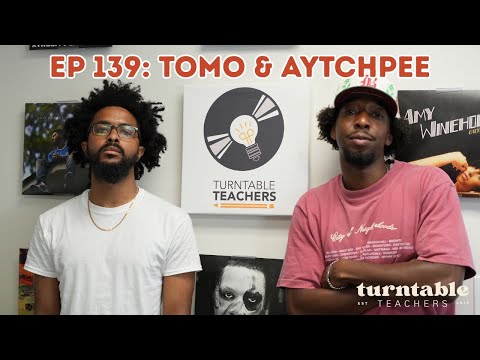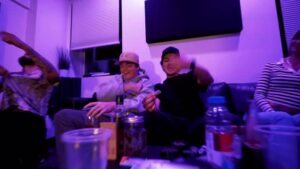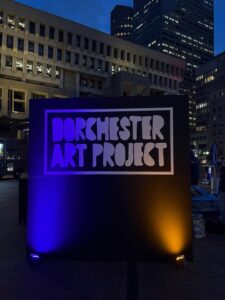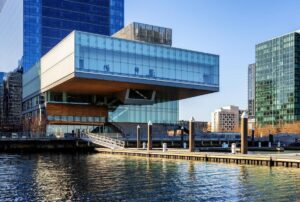Berklee graduate STAX Teixeira is shifting the spotlight onto Boston’s overlooked music and arts community with the launch of Beantown Talks, a new weekly live series built to challenge the long-standing narrative that Boston lacks culture. Streaming every Saturday on Instagram Live, the series invites musicians, artists, and local voices to speak honestly about the city’s past, present, and creative future, without filters or scripted polish.
The debut session featured Norfolk-based hard rock artist Connor Cassidy, who recently returned from Nashville’s competitive performance circuit. Their conversation surfaced a shared frustration: Boston has talent, diversity, and movement, but much of it remains invisible, even to the people who live here.
STAX admitted that after graduating from Berklee, moving to Los Angeles felt like the logical next step. “Even at Berklee, professors questioned the decision to stay,” she said, noting how common it is for young creatives to leave the city without ever seeing what it can offer. The issue, they argued, isn’t the absence of culture, but the lack of connection to it. Boston’s college students often stay inside campus bubbles, never engaging with the cultural scenes thriving in neighborhoods like Dorchester, Roxbury, and Mattapan.
Cassidy offered a revealing comparison from his time in Nashville, where artists can play multiple shows a day, but at the expense of individuality. “The Music City offers musicians opportunities to perform constantly, but it prioritizes conformity over originality,” he said. In contrast, Boston’s scene spans hip hop, rock, reggae, experimental electronic, and more. It may not have a single “signature” sound, but that eclecticism might be its strength.
The discussion also pointed out structural differences within genres. The hard rock community was described as acknowledgment-based rather than supportive, with bands rarely promoting each other’s events, a sharp contrast to Boston hip hop, where collaboration, shoutouts, and shared audiences are common. That disconnect is part of what pushed STAX to build practical infrastructure for connection, including a Discord server now holding more than 300 local creatives who share events, opportunities, and networking resources.
The irony was visible in real time: while the live session was happening, multiple artist gatherings were taking place across the city, from the ‘NOW OR NEVER: Renaissance’ show and a Bridgeside Cipher in Cambridge. Not a lack of culture, but a lack of centralized visibility.
The conversation took a personal turn when STAX spoke about growing up in Dorchester while attending a predominantly white private school in Fenway. She described learning about redlining and systemic oppression later in life as a turning point, a way to understand why her early experiences felt split between two worlds. What once felt like shame shifted into pride, identity, and clarity.
Future episodes of Beantown Talks will feature community leaders, local creatives, and eventually city officials, with an intentional focus on solutions instead of complaints. The series streams every Saturday at 2 PM, positioning itself as the kind of public space Boston’s creative community has needed, intergenerational, unfiltered, and rooted in the city’s lived reality. For a place often defined by what it supposedly lacks, Beantown Talks is proving there is more conversation, community, and culture here than outsiders, and even locals, assume.
That urgency carried into a deeper conversation around infrastructure, funding, and career pathways. Boston artists and industry professionals are calling for better support systems, more job opportunities, and stronger relationships between creative talent and the city’s corporate and institutional power. The core question raised was simple: How do artists fund their work in a system not built to sustain them?
“If every creative had ample funding to live off of their work, we wouldn’t have as much tension in the city as we do,” STAX said. “We’re kind of living off of grants right now.” The Mass Cultural Council’s five-thousand-dollar grants and Mayor Michelle Wu’s arts initiatives were acknowledged, but STAX pointed out a hard truth: “These grants are temporary. They’re not something an artist could live off of or for it to be sustainable enough.”
Cassidy, reflecting on Nashville’s model, explained that even in a city built around music, most musicians rely on cover gigs on Broadway as “day jobs.” “You’re playing other people’s music. You’re not really working on your original content,” he said. In Boston, the problem isn’t the absence of talent, it’s the absence of infrastructure. “I know very few people in Boston that are making only their money from their creativity.”
What makes that reality more frustrating, they said, is how close opportunity sits. Boston is home to companies like Bose and Converse, plus more than 150 colleges with entertainment budgets, yet creatives are often overlooked in favor of outside hires. “When they need a photographer or videographer, they’ll just go to New York,” STAX noted. “We have these major corporations literally in our home base, but they don’t know that we have everything they’re looking for right here.”
Converse’s former Rubber Tracks Studio was cited as proof of what could work, free studio access in exchange for stem use, benefiting both artists and the brand, before it was shut down in 2020. Berklee was referenced throughout the conversation as both a successful launchpad and a gatekeeper. “There’s a very direct pipeline,” STAX said. “The question is: how do we get to a point where that list isn’t exclusive to just Berklee?”
Artists for Humanity was highlighted as a rare example of a working model, a Boston-based visual arts nonprofit that partners young artists with brands like Reebok and Converse, proving the pipeline is possible when the bridge exists.
Participants agreed that Boston needs more creative-sector jobs, not just small grants and passion-driven side hustles. Time, energy, and mental bandwidth are currency, currency many artists don’t have.
The conversation also pointed to a lack of professional development resources, calling for more mentorship and industry training.
Boston has the talent, the organizations, the corporations, and government support, but what it lacks, they argued, is connective tissue. Infrastructure. Coordination. A system that doesn’t require artists to leave the city to grow.












